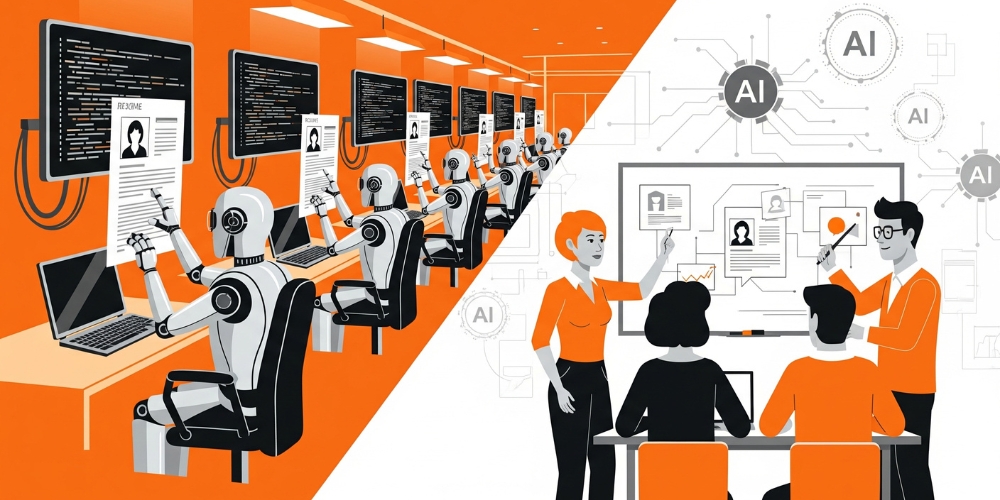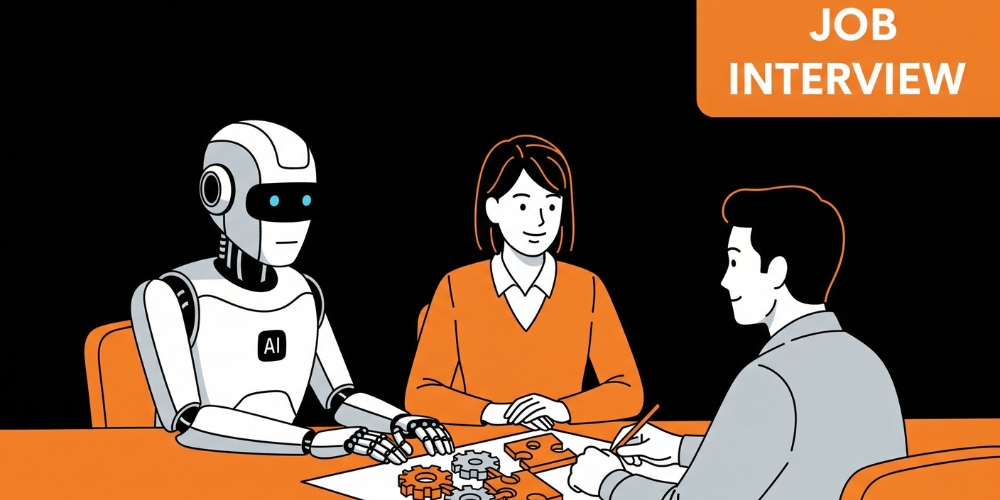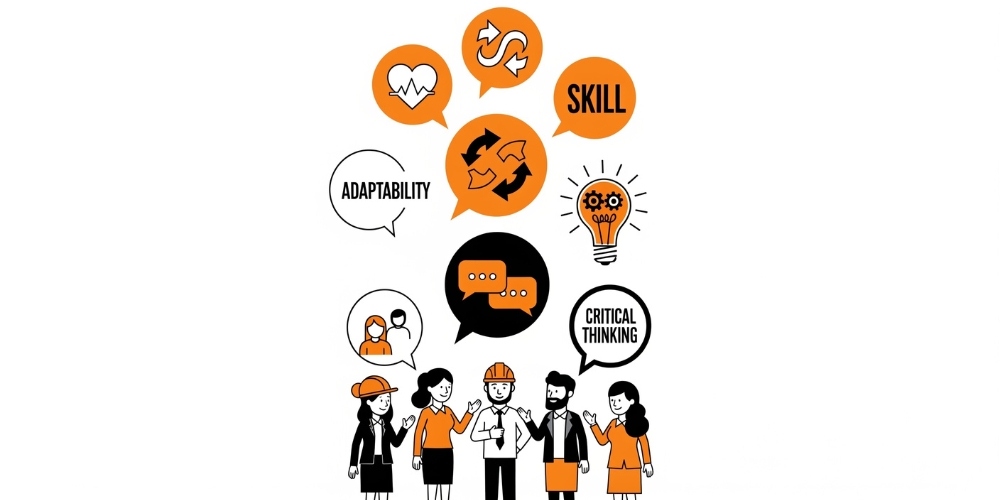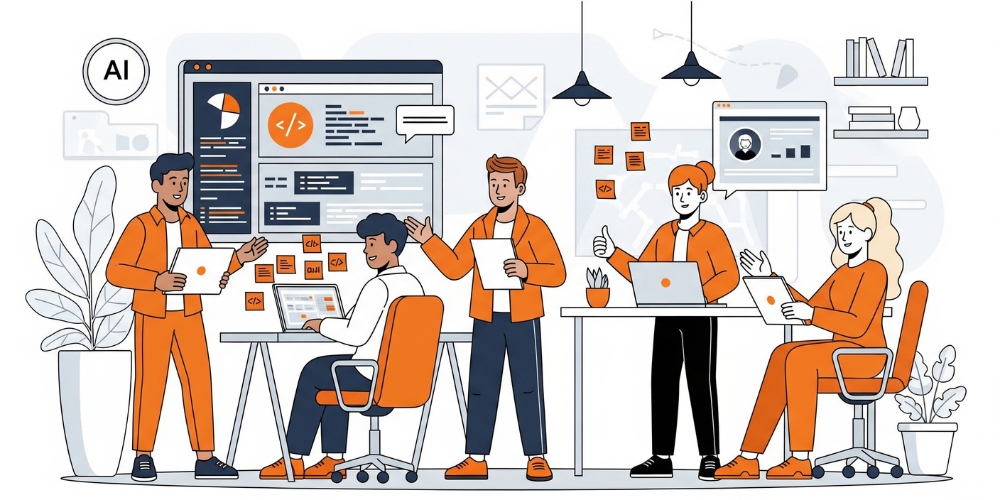
TL;DR
- AI hiring trends in 2025 focus on soft skills, not just tech skills
- Flat AI teams need strong collaboration and communication
- Artificial intelligence staffing values emotional intelligence
- AI recruitment case studies show soft skills drive success
- Knowing how to use AI in talent acquisition is not enough. Teamwork matters
For years, AI hiring trends placed technical skills at the top of the list. Writing code, building models, and tweaking neural networks used to be all it took to stand out. But in 2025, that’s changed. Even highly skilled teams with advanced degrees often struggle to deliver results. The problem is a lack of team chemistry. Many artificial intelligence recruitment agency pipelines are now bottlenecked because candidates can’t collaborate or communicate effectively.
The solution? A new kind of hiring mindset. Companies are now scouting for emotional intelligence, communication, and collaboration skills, traits once dismissed as “nice-to-haves.” As AI in the staffing industry matures, the demand for soft skills is growing increasingly. This article explores the AI hiring trends 2025 is shaping, why they matter, and how to future-proof your hiring approach in a world where “people” skills are finally being recognized as power skills.
Is Your AI Hiring Mindset Stuck in 2015?
AI in 2025: The Talent Landscape Has Evolved

The job market around AI looks very different today than it did just a couple of years ago. Demand has grown fast, and so have expectations. The global artificial intelligence staffing sector is now projected to hit $15.24 billion by 2030, growing at a steady pace of 24.8% each year. That kind of growth puts serious pressure on companies to make better hiring decisions quickly. So, what’s behind this shift?
1. Automation Isn’t the Only Game Anymore
The battle of automation vs artificial intelligence used to be about replacing repetitive tasks. Now, it’s about complementing human strengths. Automation is great at speeding up hiring pipelines. However, it’s AI, especially flat AI systems that learn without strict hierarchies, that help employers understand which candidates will thrive and not just survive, in real-world team settings.
Unlike earlier linear models, flat AI allows for dynamic collaboration between models and teams. This flexibility is now expected from people, too. Candidates who can’t pivot, cross-collaborate, or communicate under pressure often hold teams back, no matter how smart their code is.
2. Total Workforce Management Is Driving the Change
More companies are stepping back to look at the full employee journey—not just hiring. That’s where a total workforce management system becomes useful. It helps employers see the bigger picture by tracking performance, engagement, and how well teams actually work together. Hiring managers now use this data to assess not just skills, but soft-skill indicators like collaboration rate, feedback responsiveness, and initiative in problem-solving.
3. Remote Collaboration Is the New Default
Post-pandemic, remote work is no longer a perk. It’s expected. In the AI US market, especially, hybrid and remote AI roles are standard. This means candidates must be proficient in async communication, digital collaboration tools, and emotional intelligence.
Remote-friendly skills like proactivity, self-management, and tone-awareness have become new differentiators.
4. Diversity and Inclusion Are Performance Levers
It’s no longer enough to tick boxes. Diverse teams now have the numbers to prove they perform better. AI teams with high cognitive and demographic diversity deliver 19% higher innovation revenues. But hiring for diversity means more than race or gender. It means soft-skill diversity too: introverts who listen, extroverts who pitch, and team players who mediate.
That’s why smart recruiters are adapting their interview processes to assess for these traits early on, using techniques like scenario-based role plays and video-based behavioral testing.
AI Hiring Then vs. Now
Emphasis on PhDs, model training, academic credentials
Remote hiring starts, automation introduced
AI meets ethical hiring, soft skills emerge
Flat AI, culture-fit, and emotional intelligence prioritized
Why Soft Skills Matter More in AI Hiring Trends Now

In 2025, the AI hiring trends aren’t just evolving. They’re being rewritten. Companies have realized that technical brilliance without interpersonal strength is a recipe for slowdowns, conflicts, and even project failure. That’s why soft skills, once labeled “non-technical,” are now being seen as critical infrastructure in high-performing AI teams.
The Hidden Cost of Hard Skills Alone
It’s tempting to think that having the best machine learning engineers or NLP specialists ensures project success. But several high-profile failures in AI implementations say otherwise. So even the best code can’t save a project when people aren’t aligned.
AI Is Now a Team Sport
The rise of artificial intelligence staffing means more cross-functional teams: data scientists, product managers, ethicists, engineers, and customer-facing staff working together. It’s no longer enough to be brilliant solo. Now, individuals must be able to translate their work, give and receive feedback, and make decisions with others under ambiguity.
This is particularly true for AI US companies working with globally distributed teams. When communication breaks down, everything from model accuracy to delivery timelines can suffer.
Communication Has Become a Differentiator
Today, being able to communicate clearly plays a key role in business success. The World Economic Forum’s 2025 Future of Jobs Report says emotional intelligence, listening, and resilience are top skills across industries, especially in AI related roles.
What’s more, with the increasing use of total workforce management systems, recruiters are using behavioral signals, feedback ratings, collaboration scores, and internal endorsements to identify soft skill excellence before even scheduling interviews.
AI-Driven Doesn’t Mean People-Free
Ironically, the better AI in staffing industry becomes at parsing technical resumes, the more human insight is needed to evaluate empathy, adaptability, and teamwork. It’s not “automation vs artificial intelligence” anymore. It’s automation with intelligence. AI can scan for patterns, but it takes human context to understand if a candidate is coachable, curious, or collaborative.
That’s why forward-thinking firms now use AI as a co-pilot in hiring, not a replacement. Understanding how to use AI in talent acquisition involves merging resume parsing with assessments, scenario-based interviews, and cultural fit evaluations to build strong, well-rounded teams.
Soft Skills in AI Hiring: Real or Myth?
“Only coders matter in AI hiring”
❌ Myth
Soft skills drive AI team performance.
“Soft skills can’t be measured”
❌ Myth
Total workforce tools track collaboration and communication.
“Soft skills slow down tech teams”
❌ Myth
They improve speed and reduce rework by aligning teams early.
The Soft Skills Most in Demand for AI Roles in 2025

So, what exactly are these sought-after soft skills? Based on 2025 job data, recruiter interviews, and published hiring insights, here are the top soft skills that define successful AI professionals this year and why they matter.
1. Communication (Written & Verbal)
In any artificial intelligence recruitment agency, this is the most screened-for soft skill. Engineers have to explain complex concepts to non-technical stakeholders. Data scientists have to create visualizations that drive decisions. Poor communication means delayed products, misunderstood requirements, and team tension.
2. Collaboration & Teamwork
With AI being implemented across departments, from marketing to operations, cross-functional collaboration is non-negotiable. Teams must solve problems together, debug under pressure, and keep pace with shifting project scopes. The talent acquisition trends of 2025 show that companies prioritize applicants who’ve worked in agile pods or remote teams before.
Real-time feedback loops, continuous deployment, and flat AI team models demand people who can listen, iterate, and adapt fast.
3. Emotional Intelligence
AI ethics, bias mitigation, and inclusive design require empathy. Engineers must think beyond data and toward impact. Emotional intelligence helps team members navigate conflict, recognize when stakeholders feel left out, and ensure that AI systems are being developed responsibly.
4. Adaptability
In AI, what worked six months ago may be obsolete today. With LLMs, multi-modal models, and regulatory changes happening fast, employers want people who adapt, not resist.
5. Critical Thinking
AI engineers and data scientists must constantly question data sources, model choices, and real-world applications. Can this algorithm scale? Is this feature creating bias? Does the user benefit?
This is where hiring managers look for candidates who don’t just follow prompts but challenge assumptions. It’s why a growing number of employers now run case-style interviews or present AI scenarios to test thought processes, not just technical fluency.
Build the Ideal AI Hire
Drag up to 5 skills into the Hire Box
AI Teams That Prioritize Soft Skills: Real-World Examples

Companies around the world are proving that prioritizing soft skills in hiring isn’t just a nice-to-have. It’s a performance multiplier. Let’s look at how some real AI teams are making this shift and what we can learn from them.
Google DeepMind: Building Empathy into AI Collaboration
DeepMind, a leading AI research lab under Google, has long been known for its breakthroughs in reinforcement learning and protein folding (AlphaFold). But what’s less publicized is their team structure: collaboration-first. DeepMind teams are deliberately cross-disciplinary, pairing ethicists with engineers, psychologists with product managers.
They invest in soft skills workshops for researchers to learn cognitive empathy, structured communication, and inclusive feedback.
Salesforce AI: Soft Skills as a Performance KPI
Salesforce’s team integrates soft skill assessments into performance reviews. Engineers are rated not just on code quality, but also on their ability to explain model decisions to business users, mentor junior staff, and contribute to ethical discussions.
Their internal Total Workforce Management System tracks project retrospectives that highlight interpersonal effectiveness.
Conclusion
The future of hiring in AI isn’t just about identifying the best coder. It’s about assembling teams that can solve hard problems together. As AI hiring trends evolve in 2025, the spotlight has shifted from hard skills alone to a balanced view of technical expertise and soft-skill strength.
Hiring managers, recruiters, and founders must go beyond the resume and look at what makes someone a great teammate, communicator, and problem-solver. The smartest move in today’s artificial intelligence staffing landscape? Start treating soft skills as the new hard skills. Because the AI that wins in 2025 won’t just be smart. It will be human-aware, team-driven, and built on trust.
FAQs
- Communication – to explain model outputs to non-technical stakeholders
- Critical thinking – to evaluate model fairness and performance
- Adaptability – to work in fast-changing environments
- Collaboration – to build with diverse teams and align on objectives
- Empathy – to design AI systems that reflect human-centered thinking
- Behavioral interviews (e.g., “Tell me about a time” questions)
- Asynchronous video assessments to evaluate tone and communication
- Soft skill scoring tools like HireVue or Spark Hire
- Reviewing candidate behavior on platforms like GitHub or in code reviews
Successful companies blend hard and soft skills. They use a total workforce management system to track team dynamics, not just KPIs, and prioritize soft skills in hiring—because a great model is useless if it can’t be deployed, explained, or trusted.




